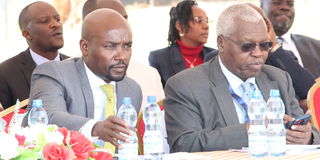Keep junior secondary in primary schools, stakeholders in South Rift say

Bomet Governor Hillary Barchok (left) and Professor Raphael Munavu, the chairman of the Presidential Working Party on Education Reforms, during a public hearing at Tenwek High School in Bomet county on November 7, 2022. Stakeholders rooted for the Junior Secondary Schools (JSS) to be retained in primary schools
Trade unions, teachers’ associations, parents and leaders in the South Rift region want junior secondary learners domiciled in primary schools.
This, they said, would avert a crisis in January 2023 when a double intake in Form One is expected with Grade Six learners who will sit the Kenya Primary Schools Education Assessment (KPSEA) and their Standard Eight counterparts who will take the Kenya Certificate of Primary Education (KCPE).
Failure by the Ministry of Education to train teachers ahead of the rollout of CBC, it emerged, is one of the major challenges facing the schools, pointing to ill-preparedness, with critics saying the system was rushed.
Bomet Governor Hillary Barchok, Kenya Union of Post Primary Education Teachers (Kuppet) assistant national treasurer Ronald Tonui, Kenya National Union of Teachers (Knut) National Executive Council (NEC) member Malel Langat, and Kenya Secondary Schools Heads Association Kericho County branch chairman Dr Dan Chelule and the Bomet branch secretary Beatrice Koech and others said a double intake will create an unprecedented crisis in the learning institutions.
There was a need to retain the 8-4-4 system of education and anchor CBC on it instead of doing away with the old system altogether, said Dr Barchok when he presented his views to the Presidential Working Party on Education Reforms, chaired by Prof Raphael Munavu, at Tenwek High School.
“The proponents do not understand what CBC is and the implementation is not based on the features that we know as experts in curriculum development,” Dr Barchok said.
He said implementation of the system was rushed with total disregard to pertinent issues raised by experts in the education sector and other key stakeholders.
“CBC is a system operating like a beheaded chicken that escaped from the slaughter and is running around. The teachers and the learners are not prepared for its deployment. As a matter of fact, even the trainers do not know what they are teaching the teachers,” Dr Barchok said.
Mr Tonui, a former Bomet Central MP, said it was unfortunate that CBC was implemented without prerequisite policies in place and public participation was not conducted.
“Even Parliament was involved when the system had already been rolled out. The former Jubilee administration was shooting blind on this matter and we are confident that with these engagements, President William Ruto’s administration will correct the mess,” Mr Tonui said.
Mr Langat said junior secondary schools (JSS) should be retained in primary schools with grades Six to Nine utilising the infrastructure in their current schools so as to avert overcrowding in secondary schools.
“There are 32,437 primary schools (public and private) nationally against 10,413 secondary schools. The secondary schools are already overstretched with the 100 percent transition policy and allowing a double intake will collapse the systems in the learning institutions,” Mr Langat said.
In Bomet County, there are 1,194 primary schools (692 public and 232 private) where 28,633 Grade Six learners are expected to join 301 secondary schools ((296 public and 5 private).
“We were interested in hosting the JSS learners in secondary schools, but the reality is that the institutions do not have the requisite infrastructural facilities to accommodate the expected high number of students joining Form One … across the country,” said Mrs Mary Rotich, the Kuppet Kericho branch executive secretary.
Dr Chelule and Mrs Koech said the content of the education system is burdensome to parents in terms of costs and the time devoted to homework for learners.
Lack of infrastructure in secondary schools and teacher shortages are the key issues hindering a double intake in secondary schools next year.
“As secondary school principals, we are generally positive on the general philosophy behind the CBC system of education but the concept of implementation needs to be reviewed to have it domiciled in primary schools,” Dr Chelule stated.
Dr Chelule said secondary schools do not have the requisite infrastructure to accommodate the learners as the schools are already congested and a double intake will create a crisis never seen in Kenyan schools since independence.
A majority of parents said the system overburdened them with homework and practical work, which they said was time-consuming and expensive.
Calls to recruit more teachers to cope with the work were made against the backdrop of acute shortages of tutors.
“We are confident that the government will employ 116,000 teachers as promised, with an expected initial 30,000 taken on board by TSC in January next year,” said Mr Paul Kimetto, the Bomet Kuppet branch secretary.
Most secondary schools have hired teachers under board of management terms to bridge the gap.





